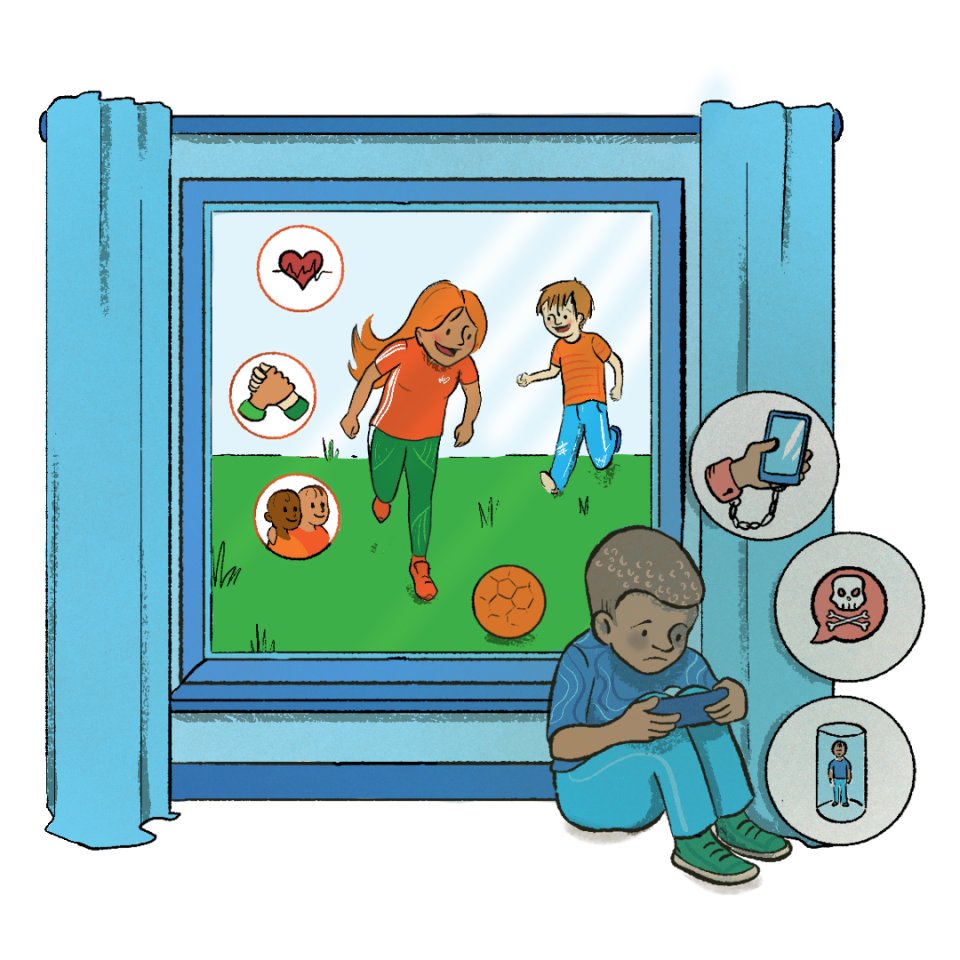As we explore our latest topic of Digital Wellbeing, we are diving into the world of social media influencers and the impact their content can have on a young person’s wellbeing. We’re also featuring advice about the best way for a young person to view and think about social media influencer posts, alongside guiding you with tips and advice that will help teachers and parents to support younger people in their care to manage the content that they consume.
What is an Influencer?
Throughout any aspect of society we’re being persuaded to buy a range of products; whether that’s clothes, food, holidays or tickets to see our favourite band. So much of this persuasion comes from advertising which many of us are familiar with on TV, in magazines or on billboards. However, as social media has grown and developed over the years, we now see this persuasion appearing on our timelines.
A lot of the time we’re being shown how a product, place or experience can have a positive impact on us by familiar or famous faces. These people are now being classed as ‘social media influencers’. When a celebrity / influencer is promoting something on social media or perhaps just posting about their day to day lives, most of the time, they are literally ‘influencing’ us to experience what they are also experiencing.
Celebrity influencers and figures from popular culture can use platforms such as Facebook, Twitter, Instagram and TikTok to promote a product, movement or even highlight an important issue towards their following. Influencers that we’re familiar with today come from different backgrounds such as reality TV, radio shows, modelling, sports, YouTube and other types of media and business. No matter who they are, if they’re promoting something or changing the way we think or feel about something, then they’re an influencer!
No matter who they are, if they’re promoting something or changing the way we think or feel about something, then they’re an influencer!
These well-known faces will also keep their following and engagement high on social media by posting content about their day to day life. Sometimes this means that young followers are more likely to see them enjoying a lifestyle that’s very different to their own. As an example, they may see influencers going to exotic locations, driving the latest cars or socialising at new and exclusive restaurants.
When this type of influencer content, is not consumed or managed in a positive way, it can have an impact on viewers, especially those from younger age groups. Below, we take you through some of the negative and positive aspects of influencer culture and how both of these sides can impact wellbeing.
How can Influencer Content Impact a Young Person’s Wellbeing?
So many things that young people experience, have a positive and negative impact on them. There are two sides to many topics and with influencers and influencer content, it is no exception.
As we touched on, influencers, in the majority, use their platform for good. It’s very rare that you would see an influencer feature or promote something that could be detrimental to their following (although it does happen on occasions). However there are factors of influencer content that can conjure up negative feeling. (Click on the icons to find out more)
Sometimes, influencer content has been manufactured in a way to make someone think that what they’re looking at is the ideal lifestyle. Like adverts, this manufacturing is used to sell something to the viewer. Compared to other age groups, younger people can become highly influenced and many could start comparing their lifestyle to the overly stylised way of life that they view on social media.
Sometimes this comparison can have a negative effect on self-esteem as explained in this article from BBC Three.
It’s important for a young person to try and remember that comparing themselves to their favourite influencer or celebrity is not the best practice. Yes, they can aspire to be like someone they look up to (we all do) but everyone on this planet has a different way of living. With online celebrities, it just so happens that their favourite ‘Love Islander’, or Footballer has gone down different routes that have given them the platform to promote products or showcase their lifestyle to others.
5.6% of 13 – 17 year olds use Instagram in the UK and with it being a visual only platform, that percentage can be exposed to a vast amount of images that again, can conjure up the need to compare.
Many influencers may post photographs that have been edited, as described by the ASA. Some photographs will also feature the use of filters, which are features that allow a social media user to edit or modify a photograph in one click (although, influencers have now been told not to use ‘misleading’ beauty filters). Again, when young people view these images, it can lead them to think that’s how their look needs to change in order to reflect what they’re seeing online and follow the supposed trend.
Despite the issue surrounding enhanced imagery, it’s important to emphasise to a young person to try and not focus on what an influencer looks like, because truthfully they don’t always look like how they do on Instagram. This is also a fact that influencers such as Vicky Pattison are reiterating, to help change the way that social media audiences acknowledge and perceive body image. When influencers take steps like this, it can help a young person to understand and support the mentality that how a person feels or behaves is what matters the most.
Celebrity influencers will look to keep their social media following and levels of interactivity high which will work towards increasing their overall awareness.
To keep their following engaged, influencers are likely to also post content that gives people a glimpse into their everyday life. These posts are different to the influencer content that was mentioned above, as they don’t promote anything. However, influencers could show themselves on holiday, eating out, partying, shopping; anything that shows ‘day to day’ activity.
We all share similar posts on social media, so really, there is nothing wrong with influencers posting this type of content; however younger people may view this content and compare what their day to day life is like. Once content like this is viewed regularly, this comparison can increase and young social media users can develop feelings such as FOMO (Fear of Missing Out). FOMO can cause young people to try and imitate the experiences that they see others having on social media, so they don’t feel like they’re missing out on anything. This can add a lot of pressure to someone, especially if an experience isn’t achieved which can lead to certain negative feelings such as loneliness, and other negative ways of thinking.
Younger people shouldn’t feel pressured to imitate an influencer’s life; we all do different things and we all enjoy life in different ways. It’s beneficial for younger age groups to focus more on the things that they enjoy, such as playing their favourite sport, hanging out with friends, reading their favourite book or playing a fun computer game We can reiterate this fact to a younger person, to ease these feelings of pressure and the need to experience what they see others experiencing.
The Positives of Influencer Culture
We have explained that influencer culture, like many other things, has positive and negatives. We’ve looked at the negatives of influencer culture and content, but now let’s explore the positives, because there are also steps that influencers do take to support their audiences. (Click on the icons to find out more)
Featured in BBC Three’s ‘How we're all being changed by influencer culture’ article, psychology professor, Dr Danielle Wagstaff explained why influencers are a force for good:
‘‘ …We see influencers having great positive effects, promoting things like body positivity, spreading messages about speaking out against toxic masculinity, the #MeToo movement which has rapidly changed the way people think about and approach sexual assault, and environmentally conscious movements like veganism. Rapidly these trends are changing our expectations about our rights, about what we can do to get support, and about it being okay to say you’re not okay’’
As emphasised in this quote, many influencers use their platform to highlight prevalent issues in our society.
One ‘Influencer’ who immediately springs to mind is Marcus Rashford who used his high social media and celebrity following to highlight issues faced by children and families on low incomes. He now also uses his platform for the ‘Full Time Meals’ campaign, supported by Facebook and Instagram, to help families and younger people cook simple, healthy meals on a low budget. Alongside his books and his continuous work to support the younger generation, he his one famous face who has highlighted issues in our society and used his influencer status to promote change.
Another issue that is highlighted by many influencers is Mental Health. Over the last few years, influencers have become more open about talking about their own mental health struggles, whilst also using their content to signpost any of their followers to supportive resources and guidance.
This list indicates just some of the influencers who have allowed young followers to have open and honest conversations about how they are feeling! Many famous faces in this list are now ambassadors of mental health organisations and charities, showing how they are expanding their influence by also supporting others, away from social media.
We previously reflected on influencers who were doing more to change perceptions and increase knowledge of body image and the many topics that relate to this. Alongside Vicky Pattison, there are influencers such as Dr. Alex George and Malin Andersson who have posted about their own experiences and knowledge to help destigmatise the subject of body image and to also highlight supportive avenues for younger people. (One of Dr Alex’s Instagram posts is a good example of this)
These are just a small number of ways that influencers do use their platform for good. Young people can be taught ways to focus on these positive aspects of influencer culture. Once they expose themselves to this positive and supportive content, they can develop a healthier relationship with social media and the people that they are following.
Podcast Episode
How to support young people
We’ve explored some steps that teachers, parents and carers can take to support younger age groups, however there are more things that young people can learn so they don’t become negatively impacted by what they view on a daily basis. We’ve put together a guide that can support you to help them create a more positive online space. Discover our advice and guidance here
age groups, however there are more things that young people can learn so they don’t become negatively impacted by what they view on a daily basis. We’ve put together a guide that can support you to help them create a more positive online space. Discover our advice and guidance here
Comparison has been an underlying factor throughout this piece and BBC Bitesize also offer advice and tips advising young people about how they can ease comparing themselves to others, online.
ProjectEVOLVE is also here to enable teachers to access more informative teaching resources around many aspects of social media and wellbeing. Our service provides effective resources to teachers of any age group, including 13 – 18 year olds!
Finally don’t forget to visit our Digital Wellbeing hub throughout this month, to gain more resources and guidance on the subject. We’re taking an in-depth look at many different aspects of digital wellbeing, so please visit our website to discover more. Alternatively you can also keep up to date with all of our advice and resources by signing up to our newsletter!
